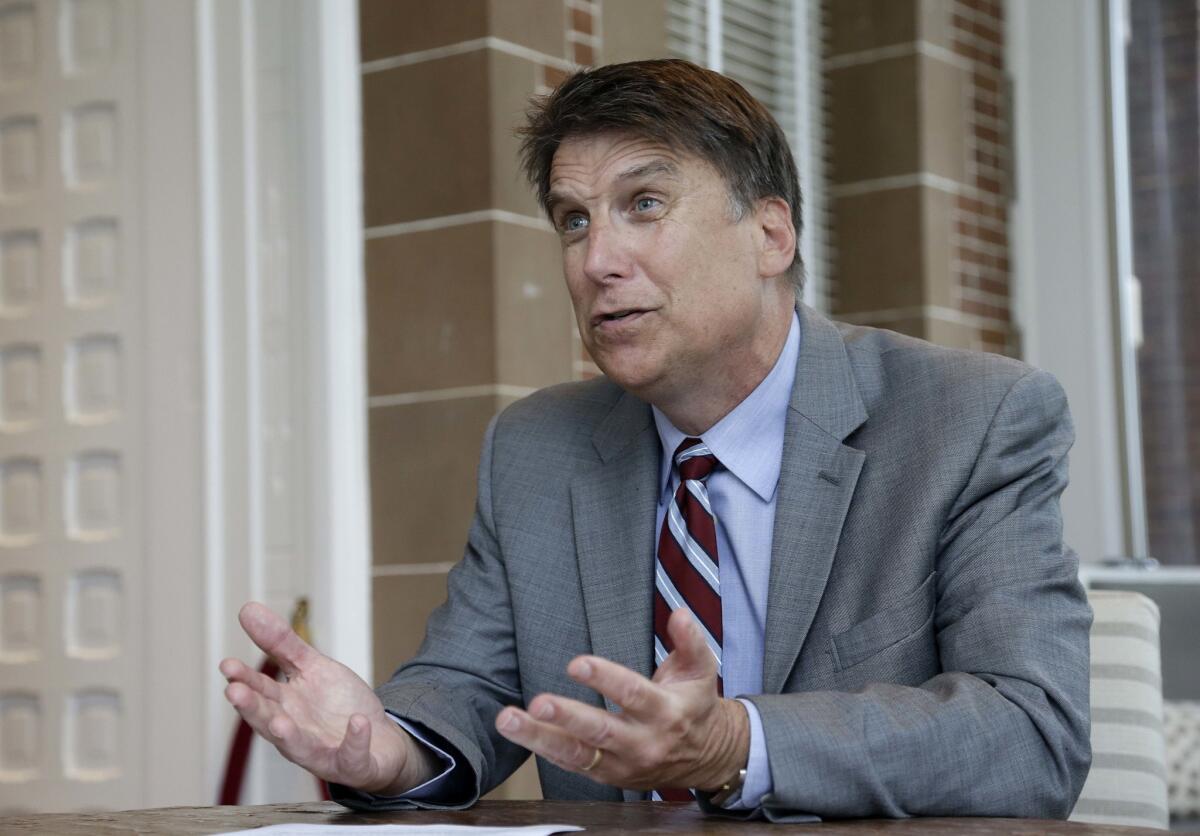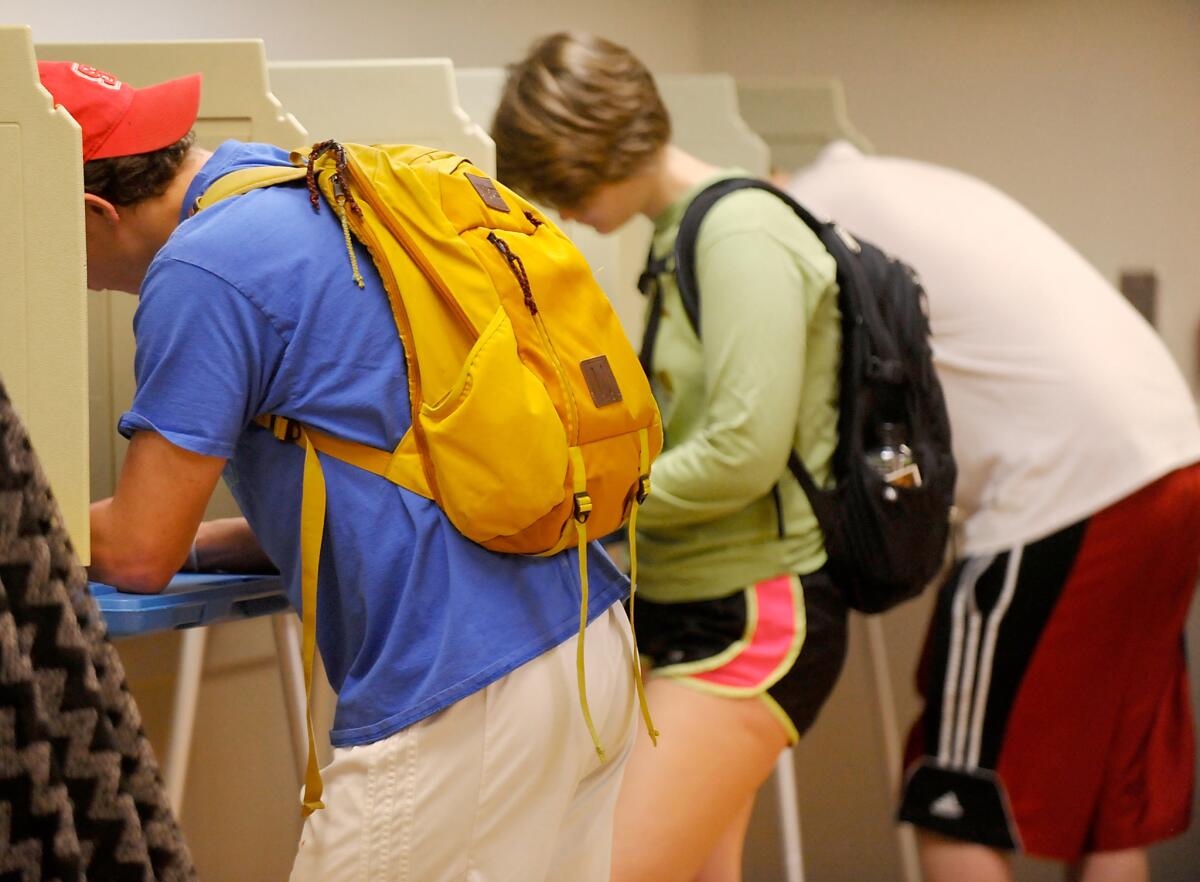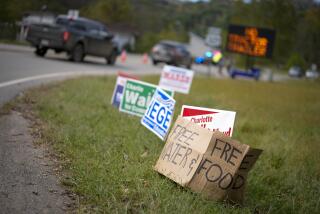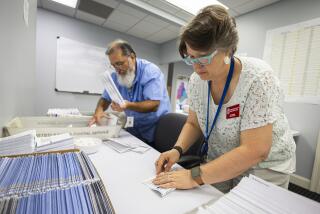Voting has gotten tougher in 17 states, and it could alter elections
Reporting from Atlanta â Morris Reid did not expect any problems when he went to his local polling station outside Raleigh, N.C., to vote in the 2014 midterm. Yet the long-time voter, a 57-year-old Democrat, found he could not cast his ballot.
A poll worker told the African American jail superintendent he was registered in another county.
Reid was certain there had been a mistake â heâd instructed the Department of Motor Vehicles to update his voter registration when he moved three months before â but he drove five miles to another polling center, only to find he was not registered there either. After a third trip, he cast a provisional ballot, which ultimately did not count thanks to a new North Carolina law that eliminates out-of-precinct voting.
âI couldnât exercise my right to vote,â he said. âAnd thatâs the way it was.â
As the nation approaches its first presidential election in 50 years without a core protection of the Voting Rights Actâ the requirement that states with a history of discrimination get federal approval before changing electoral practices â large swaths of the electorate face new voting hurdles.
Over the last four years, 17 states, mostly in the Deep South and Midwest, have passed stringent voting laws. Many demand voters show official photo ID. Others restrict early voting, eliminate same-day registration, remove out-of-precinct voting, limit mail-in ballots, require proof of citizenship, curb voter registration drives and tighten absentee ballot rules.
âMillions could have a harder time voting,â said Myrna Perez, deputy director of the Brennan Center for Justiceâs Democracy Program at New York University. âOur historical trajectory has been to find ways to expand the franchise and to expand access. These laws are a very strict departure from that. The question I always ask is: What are we getting for it? What sort of benefit comes from making voting harder?â
Most of the restrictions have been approved in Republican-controlled states where supporters assert they are merely trying to thwart voter fraud. Yet there is scant evidence of such fraud: One expert found 31 cases out of more than 1 billion ballots in the U.S. from 2000 to 2014.

North Carolina Gov. Pat McCrory.
Critics say the new laws represent a deliberate attempt to disenfranchise minority voters â one that could have significant repercussions in the upcoming presidential election, potentially giving the GOP an advantage in some closely contested battleground states.
âThe real tragedy is that it makes it quite a bit harder for some folks and not at all harder for others,â said Thomas Carsey, a political science professor at the University of North Carolina at Chapel Hill. âIt is the disproportionate impact that makes critics call the law unfair and gives it the appearance of being politically motivated.â
The challenge is measuring exactly how the laws might thwart voter turnout and impose a disproportionate burden on poor and minority voters. It is not easy to track those who do not show up, or are turned away, at the polls.
See more of our top stories on Facebook >>
âWill we truly know if someone chose not to vote based on voter ID or something else?â said Michael Bitzer, a professor of political science at Catawba College, a private liberal arts college in Salisbury, N.C. âWe donât have a clear understanding of what motivates people to not turn up and vote.â
Some studies show that stricter voting laws have depressed voter turnout, particularly among minority groups. A 2014 analysis by the U.S. Government Accountability Office found that tighter voter ID requirements led to a 2% drop in turnout in Kansas and Tennessee from the 2008 to the 2012 general elections. It also found that turnout was more likely to decline among younger, newly registered and African American voters.
Even when voter laws do not technically prevent people from voting, they can create confusion that discourages turnout.
A study by the Baker Institute of Public Policy at Rice University examined the impact of Texasâ voter ID law on a 2014 congressional election, surveying more than 400 registered Texas voters who did not cast a ballot. It found that while 12% cited lack of approved photo ID as a reason for not voting, only 2% actually lacked a photo ID. Latinos were significantly more likely than whites to cite lack of photo ID as a reason for not voting.
âIn a swing state that could be on a knife edge, voter restrictions could make a real difference,â said Mark Jones, a political science professor at Rice University and principal investigator of the report. âIt can tilt the balance from one candidate to the other.â
Any drop in turnout could have a critical impact in North Carolina, a Republican-dominated state where electoral results have been tightly contested in the last decade. In 2008, Barack Obama won the state by just 14,177 votes. Four years later, Mitt Romney won by 92,004 votes.
After Obamaâs victory, Republican strategists were quick to spot the Democratsâ success in mobilizing minority voters: âThe campaign targeted the most likely straight-ticket voters and made sure they voted early,â Jack Hawke, campaign manager for Republican Gov. Pat McCrory in his failed 2008 run and former chairman of the state GOP, wrote in Carolina Journal. âThe number of black and young voters was unprecedented.â
A month after the U.S. Supreme Court struck down a key part of the Voting Rights Act in 2013, legislators in the state passed a sweeping new voter law that eliminated same-day registration, cut the early-voting period by seven days, barred voters from casting provisional ballots outside their home precincts, required voters to show government-issued photo identification, and ended preregistration for 16- and 17-year-olds.
âItâs not that they are racists,â said Bob Hall, executive director of Democracy North Carolina, a nonpartisan advocacy group that focuses on increasing voter participation. âItâs just to win elections they must change the rules that let so many African Americans and young people vote.â

North Carolina State University students vote in the stateâs primary in March.
Last year, just before the law was due to be challenged in federal court, legislators loosened the photo ID requirement to allow residents without government-issued photo IDs to cast a provisional ballot if they filled out a form claiming a âreasonable impediment.â
Defenders of the law deny the argument that it imposes a greater burden on minority voters. During the federal trial, the stateâs legal team noted that turnout among African Americans and Latinos jumped in the 2014 midterm election, when all provisions of the law, except for voter ID, were in effect.
Critics counter that recent surges in minority votes are due to a complex mix of factors: rapid demographic change, a rise in grass-roots organizing, and â in the 2014 election â a particularly competitive U.S. Senate race. Minority turnout would have been even higher, some say, if legislators had not tightened voting rules.
A report by Democracy North Carolina has estimated that the new voting restrictions, in conjunction with polling station problems, reduced 2014 turnout by at least 30,000 voters. More than 2,300 voters who cast rejected provisional ballots â 38% of whom were African Americanâ would have had their votes count if same-day registration and out-of-precinct voting had still been in place.
In the March primary, more than 29,000 North Carolina voters were able to use same-day registration and out-of-precinct voting, after an intervention from a U.S. Court of Appeals. Yet 1,320 ballots were rejected because voters did not show poll workers an approved form of photo ID, according to preliminary data from the stateâs Board of Elections.
Last month, a federal judge upheld North Carolinaâs law, arguing that the state had provided âlegitimate interestsâ for its voter restrictions and the Justice Department and civil rights groups failed to establish that âAfrican Americans or Hispanics have less opportunity than other members of the electorate to participate in the political process.â
Opponents of the law moved swiftly to appeal the ruling, yet it is likely to be in effect in November when the nation picks a new president.
Jarvie is a special correspondent based in Atlanta.
ALSO
HB2: A video timeline of North Carolinaâs newest law
U.S. government: North Carolina LGBT law violates civil rights
More to Read
Sign up for Essential California
The most important California stories and recommendations in your inbox every morning.
You may occasionally receive promotional content from the Los Angeles Times.











